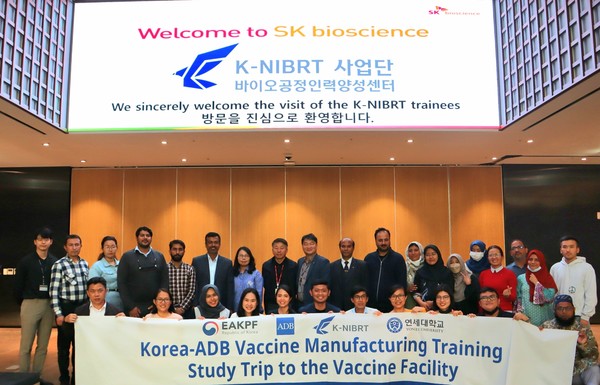SK Bioscience said on Thursday that it has conducted a vaccine production training for people from developing countries at the L House, a vaccine plant located in Andong, North Gyeongsang Province, following the World Health Organization’s (WHO) designation of Korea as a global biomanufacturing training hub.

The training is jointly promoted by the Ministry of Health and Welfare, the Ministry of Strategy and Finance, Yonsei University's Korea National Institute for Bioprocessing and Research and Training (K-NIBRT) Project Group, and the Asian Development Bank (ADB).
The program aims to bridge the regional gap in vaccine production capacity by fostering talent in middle and underdeveloped countries.
South Korea was designated by the WHO in February as a global biomanufacturing training hub based on domestic companies' vaccine and bio-production capabilities and excellent educational infrastructure.
In the training, 26 trainees from 12 developing countries in the ADB region including Vietnam, Indonesia, and Thailand were introduced to the production facilities where Korea’s first homegrown Covid-19 vaccine SKYCovione was made.
Trainees visited vaccine undiluted and finished production facilities and quality control laboratories at Andong L House and learned about Korea's domestic vaccine production process.
The L House was the first Korean vaccine manufacturing facility to obtain EU-GMP (Good Manufacturing Practice) which is a certificate of excellent drug manufacturing and quality control standards) certification approved by the European Medicines Agency and was also recognized for its global production capabilities by obtaining GMPs from many regulatory agencies including WHO.
"It was rewarding to visit the world-class production facility where various types of vaccines are produced and learn about the domestic production process which I have only learnt through theory before,” Bangladeshi trainee Mozahidur Rahaman said. “Based on today's experience, I am motivated to use this knowledge to improve our work flows back home to keep more people safe with vaccines when new viruses emerge."
"Cultivating global bio talent is the responsibility of the vaccine sector and the most basic effort to protect humanity from the new pandemic," SK Bioscience CEO Ahn Jae-yong said. "Starting with this training program, we will support the growth of bio talents both at home and abroad."

